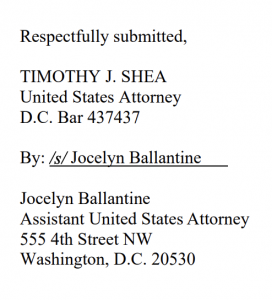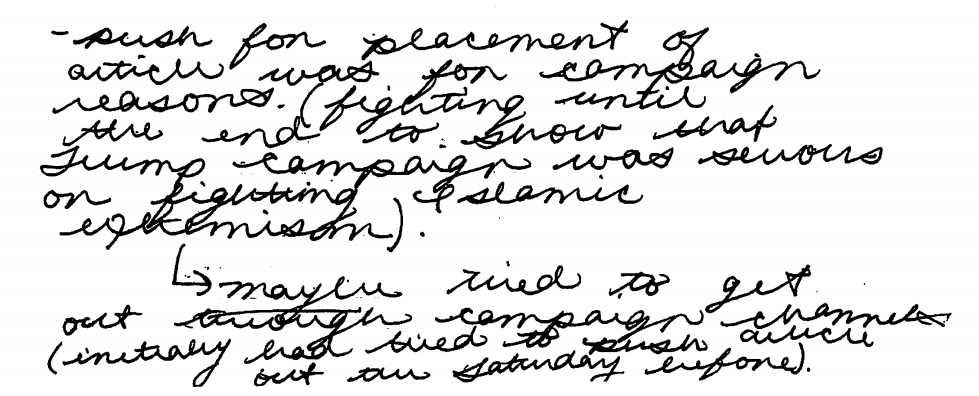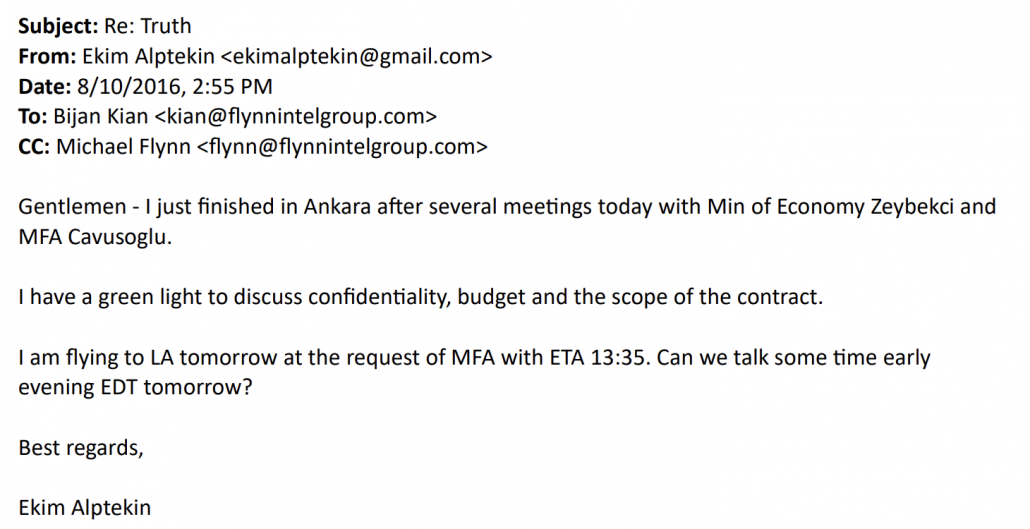The Four Ways Trump Can Ensure Mike Flynn Avoids Accountability for His Lies
In this post, I suggested that Billy Barr and Sidney Powell have worked together to pursue about four different ways to ensure that Mike Flynn does no prison time (though, it’s worth remembering, that Robert Mueller recommended probation for Flynn, and it’s only Flynn’s own efforts to undermine Mueller’s authority that have exposed him to real prison time). I also said that most people engaged in the debate over Flynn’s status show little to no familiarity with the status of his case. I’d like to lay out that status here.
Flynn’s sworn statements
First, it’s important to know the substance of the various statements Mike Flynn has made and how they conflict, to understand how risky his current gambit would be if not for the personal efforts of the Attorney General. All these statements are at issue:
- December 1, 2017: Mike Flynn pled guilty before Judge Rudolph Contreras to lying in a January 24, 2017 FBI interview. In his plea allocution, Flynn admitted:
- He lied about several conversations with Sergey Kislyak about sanctions
- He lied about several conversations with Kislyak about an attempt to undermine an Obama effort at the UN
- He lied about whether his company knew that it was working for the government of Turkey and about whether senior officials from Turkey were overseeing that contract
- He was satisfied with the services his attorneys had provided
- No other threats or promises were made to him except what was in the plea agreement
- December 18, 2018: Mike Flynn reallocuted his guilty plea before Judge Emmet Sullivan to lying in a January 24, 2017 FBI interview. In his plea allocution, Flynn admitted:
- He lied about several conversations with Sergey Kislyak about sanctions
- He lied about several conversations with Kislyak about an attempt to undermine an Obama effort at the UN
- He lied about whether his company knew that it was working for the government of Turkey and about whether senior officials from Turkey were overseeing that contract
- He was satisfied with the services his attorneys had provided
- He did not want a Curcio counsel appointed to give him a second opinion on pleading guilty
- He did not want to challenge the circumstances of his January 24, 2017 interview and understood by pleading guilty he was giving up his right to do so permanently
- He did not want to withdraw his plea having learned that Peter Strzok and others were investigated for misconduct
- During his interview with the FBI, he was aware that lying to the FBI was a federal crime
- June 26, 2018: Mike Flynn testified to an EDVA grand jury, among other things, that “from the beginning,” his 2016 consulting project “was always on behalf of elements within the Turkish government,” he and Bijan Kian would “always talk about Gulen as sort of a sharp point” in relations between Turkey and the US as part of the project (though there was some discussion about business climate), and he and his partner “didn’t have any conversations about” a November 8, 2016 op-ed published under his name until “Bijan [] sent me a draft of it a couple of days prior, maybe about a week prior.” The statements conflict with a FARA filing submitted under Flynn’s name.
- January 29, 2020: Mike Flynn declared, under oath that, “in truth, I never lied.” Flynn claims he forgot about the substance of his conversations with the Russian Ambassador, rather than lied about them.
The substance of these sworn statements are important for several reasons. First, it is virtually impossible to look at these four sworn statements and conclude that he did not lie in at least one of them. In the course of challenging his guilty pleas, he has made statements that may amount to perjury, perjury to judges rather than false statements to Peter Strzok.
In addition, these statements severely constrain both of Flynn’s current legal attempts to renege on his guilty pleas, because he has already sworn that the things he now is claiming were not true.
They also change the landscape of possibilities if one of them — a motion to withdraw his plea — were successful, because there are a number of witnesses who have already testified that his statements were false for some of the statements that he twice pled were false. For example, several of Trump’s aides told Mueller they recognized Flynn lied in his FBI interview. Others told Mueller he was lying to them. KT McFarland and Jared Kushner testified about the UN ploy. And a number of people changed their testimony after Flynn pled, making it more clear that they were all adhering to a cover story. In short, while many people believe that if DOJ had to prosecute Flynn for his original false statements, it would pit him (with little credibility) against Strzok (with severely damaged credibility), that doesn’t account for the other witnesses against him who, if they altered their testimony, would put themselves at risk for false statements charges.
The four efforts to reverse Flynn’s guilty pleas
By my read, there are four efforts underway to reverse Flynn’s guilty pleas. Few people realize that Flynn has two separate legal challenges going on.
Motion to withdraw his guilty plea
The first is a motion that argues that Covington & Burling, the white shoe law firm that (at least per public records) gave Flynn 30 months of representation they never got paid for, provided inadequate legal representation in at least three matters:
- Covington wrote the FARA filing that posed the biggest legal risk for Flynn when he pled guilty in 2017, and so had an incentive to advise him to plead guilty so as to avoid any exposure themselves for presenting a deceitful filing to DOJ.
- Covington did not provide Flynn adequate notice of the conflict this presented.
- Covington also withheld information from Flynn — such as that the FBI Agents who interviewed him thought he was a convincing liar — that he now claims would have led him not to plead guilty had he known it.
Even in the public record, there’s evidence these claims are not true. For example, notes taken by Covington that Flynn himself released record him telling them things that made it into the FARA filing but which even his grand jury testimony he said were not true. In other words, both materials Flynn has himself released and his own sworn statement undermine this claim.
Furthermore, Flynn’s own filings show other holes in Flynn’s argument, such as at least one additional warning from Covington about any conflict, along with evidence Covington found an unconflicted attorney and suggested Flynn consult with that lawyer about their representation.
But since Flynn filed this motion, Covington has turned over 500 additional pages of evidence to prove their competence, as well as 100 pages of sworn declarations. Sidney Powell has made aggressive claims that damage Covington’s reputation, they appear to have gotten paid nothing for representing Flynn, and Judge Emmet Sullivan showed some interest in putting everyone under oath to fight this out. So it’s possible that this will lead to a spectacular hearing where very reputable Republican lawyers will have an opportunity to disclose how much Flynn lied to them.
That said, Sullivan seems to be getting justifiably cranky with Covington because they keep finding documents they didn’t turn over to Flynn last year. He ordered the firm to file a notice of compliance indicating they had researched all their files to make sure they had gotten everything, which is due at noon today.
If Flynn succeeded in withdrawing his guilty plea without incurring perjury charges for his two plea allocutions and his grand jury testimony, he still could be prosecuted. While it’s unlikely (unless this whole effort extends into a Joe Biden administration), that prosecution could include a Foreign Agent 951 claim on top of the FARA claim and it could include Flynn’s son.
On May 8, the government will provide a status update or proposed briefing schedule on Motion to Withdraw. Most likely, this will be an anodyne filing. But it’s possible we’ll get a summary of what Covington included in the 600 pages they turned over, which may be very damaging to Flynn’s case.
Motion to dismiss for prosecutorial misconduct
In addition to the motion to withdraw, Flynn also is asking Judge Sullivan to dismiss his case for prosecutorial misconduct. Effectively, Flynn is arguing that mean FBI agents had it in for Mike Flynn and so ambushed the 30 year intelligence veteran on January 24, 2017, and tricked him into lying so they could either get him fired or prosecute him.
Because Powell asked Sullivan to dismiss Flynn’s case in a motion that purported to be a Brady challenge last fall, Judge Sullivan has already written a meticulous 92-page opinion denying these arguments, explicitly distinguishing what happened to Flynn from what happened to Ted Stevens. Powell even had to and did say, in this motion to dismiss, something akin to, “no, even though I already asked you to dismiss this case, that wasn’t my motion, this is.” Flynn’s original motion submitted in January, however, added nothing new. Rather, it asked Sullivan to dismiss the case against Flynn because FBI’s FISA applications against Carter Page were problematic.
Since then, Flynn has used the serial receipt of documents turned over in conjunction with Jeffrey Jensen’s review of his case to claim new evidence of misconduct. Those documents include proof that, contrary to Flynn’s claims, the promise that by pleading guilty Flynn would spare his son criminal investigation was not a promise. It includes notes on how the FBI prepared for the interview with Flynn, notes that — because they reflect actions not taken — are probably not directly relevant to his case anyway. Nevertheless, those notes are what Flynn’s backers point to to claim that the FBI thought it would be obvious that someone who had secretly called up the country that just attacked America and convinced them not to worry about the punishment for the attack could not serve as National Security Advisor. Finally, those documents include proof that, after considering whether some things Flynn had done in the past meant he could be a Russian threat, the FBI concluded they did not, and only after that discovered the call transcripts with Sergey Kislyak showing something far more concerning. Powell released these filings with no substantive argument about how they prove her case, using them instead to fire up Flynn’s backers who show little understanding of the case.
It’s always a fool’s errand to predict how Judge Sullivan will feel about such things. But this last filing actually dramatically undercuts a claim that Powell has made from the start, that the effort to “get” her client arose out of personal animus, and continued in unrelenting fashion until the FBI trapped Flynn in a perjury trap. If the FBI were motived by animus, as alleged, then they would never have moved to close the case against him. The only reason they did not is because they found evidence he had secretly called up the country that just attacked us and told them not to worry about the punishment. That is, the FBI reviewed some allegations against Flynn, found them wanting (which is proof that they were basing their decisions on the evidence, not any negative views about Flynn), and only after that did he give them real reason to be concerned, something totally unrelated to many of the allegations Powell based her original complaints on, that they continued the prosecution. (Flynn’s backers often forget that the FARA investigation had already started by this point, which was an urgent concern of its own right.)
In any case, those serial releases had been serving to keep the frothy right chasing one after another shiny object. But last week Judge Sullivan called a halt to them, ordering Powell to hold all her new exhibits until the government is done turning them over.
On May 11, the government will file a response to whatever Flynn’s motion to dismiss consists of by that time, with Flynn’s reply due May 18.
The Jeffrey Jensen review of Flynn’s prosecution
Approximately the week before Flynn filed his motion to dismiss, Barr appointed the St. Louis US Attorney, Jeffrey Jensen, to review Flynn’s prosecution.
It’s hard to overstate how abusive this was, on Barr’s part. When Barr did this, Judge Sullivan had already ruled there was no reason to dismiss the prosecution, and ruled that the items now being produced were not discoverable under Brady. What the review has done, thus far, has been to provide Flynn with documents that someone — presumably Derek Harvey — had reviewed, so he can obtain stuff even Judge Sullivan ruled he was never entitled to receive.
Moreover, Barr did this even though he had already appointed John Durham to review what has come to incorporate Flynn’s prosecution under a criminal standard. Durham could obtain all this evidence himself as part of his investigation, but he can only do something with it if it is evidence of a crime. Effectively, Barr has asked two different prosecutors to review this prosecution, the latter effort of which came after a judge had already ruled against it.
That said, given the prospect that litigation over Covington’s supposed incompetence may be highly damning to Flynn’s reputation, the Jensen review provides Barr with another option. He can use it as an excuse to order prosecutors to withdraw their opposition to Flynn’s motion to dismiss. It’s unclear whether Jensen has found anything to merit that yet, and Jensen appears to be engaging in analysis that might undercut where Barr wants to go with this (though given how closely Deputy Attorney General Jeffrey Rosen’s office is involved in this, I doubt that will happen). That said, Barr’s treatment of the Mueller Report proves that he has no compunction about claiming that a prosecutor’s conclusions say one thing when in fact they say something very different. And so at any moment, Barr may order prosecutors to effectively wipe away the prosecution of General Flynn.
One tea leaf, at least thus far, is that Brandon Van Grack has not withdrawn from Flynn’s case. Had he been referred for misconduct, you would expect that to show up in the docket.
The inevitable pardon
These efforts — Flynn’s effort to withdraw his guilty plea, his effort to get his prosecution thrown out for misconduct, and DOJ’s effort to find some basis to dismiss it on their own — are all ways of eliminating the Flynn prosecution in ways that would help Trump’s claim of victimization. They would provide a way for Trump to pay back Flynn’s silence about his own role in the sanctions call with Kislyak without having to issue a pardon to do so.
But those efforts can only do so much by themselves, particularly given the number of conflicting sworn statements Flynn has made.
Assuming that Barr would eventually move to withdraw DOJ’s opposition to Flynn’s motion to dismiss, it might have the effect of mooting the motion to withdraw Flynn’s guilty plea as well, effectively wiping out the existing charges against Flynn. But only if Sullivan were to accept the dismissal of the two pleas; it would be at his discretion.
And Judge Sullivan could, on his own, deem that Flynn has lied to him (and Judge Rudolph Contreras) under oath. There is literally no way to reconcile the conflicts in Flynn’s sworn statements; some of them must be false. And Sullivan has the authority to — and the temperament to — appoint a special prosecutor to investigate and prosecute Flynn for perjury. That’s effectively what Sullivan did in response to the misconduct against Ted Stevens.
As noted above: it’s a fool’s errand to try to predict how Judge Sullivan will respond to stuff like this. It’s unclear whether he will be impressed with the new evidence Powell is floating. But it is possible he remains as fed up as he clearly was in December, and as a judge he does have means of doing something about it.
But as President, Trump always has the power of pardon, and there is zero reason to believe he won’t be using it aggressively on November 4, regardless of the outcome. Indeed, if Trump were to pardon Flynn for perjuring himself before several judges, it would be the exact equivalent of what he did for Joe Arpaio, saving him from being subject to the authority of a judge. Trump can do that at any time — he just presumably wants to avoid doing so until after the election.
Ultimately, Trump has four possible ways to get Flynn out of his guilty verdict. And it is virtually guaranteed that one of them will work.
Update: Corrected how long Covington worked for Flynn.
Update: bmaz has convinced me that even if Barr forces DOJ to end its contest to the motion to dismiss, Sullivan would still have discretion to reject any motion to dismiss; I’ve updated the post accordingly.
Update: Corrected that it was Flynn, not the government, that submitted the exhibit showing that Covington gave Flynn more warning on conflict than he claims in his own declaration.
Update: Here’s Covington’s notice of compliance with Sullivan’s order to make sure they’ve handed everything over. Unsurprisingly, Sidney Powell is asking for stuff that goes well beyond the client file, perhaps as a stall.






